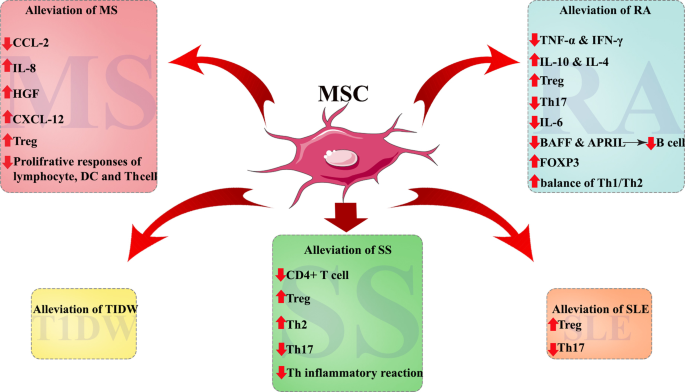Some Ideas on Regenerative Medicine For Multiple Sclerosis You Need To Know
Regenerative Medicine For Multiple Sclerosis Fundamentals Explained
Table of ContentsUnknown Facts About Regenerative Medicine For Multiple SclerosisExamine This Report on Regenerative Medicine For Multiple SclerosisThe Basic Principles Of Regenerative Medicine For Multiple Sclerosis Unknown Facts About Regenerative Medicine For Multiple SclerosisThe 9-Second Trick For Regenerative Medicine For Multiple SclerosisNot known Details About Regenerative Medicine For Multiple Sclerosis The Best Strategy To Use For Regenerative Medicine For Multiple Sclerosis
The mesenchymal stem cells transplanted during stem cell therapy can separate and grow to create new cells that can take the location of the damaged cells of the anxious cells. This might recover neurological functions in individuals with this condition. These advantages of stem cell therapy are more sustained by the capability of MSCs to promote recovery.Clients with multiple sclerosis are typically treated with mesenchymal stem cells. These are multipotent stem cells that have the capability to set apart and mature to form a vast variety of cell enters the body. When transplanted, these stem cells can establish to develop healthy and balanced afferent neuron thus sustaining the regeneration of the damaged tissues of the anxious system.
Once transplanted, the stem cells move to locations of swelling or damages within the main nerve system (CNS). They are naturally attracted to the websites of injury where the immune system is assaulting the myelin sheath, the protective covering of nerve fibers. The stem cells work by promoting the repair work and regrowth of damaged myelin, possibly bring back feature to influenced afferent neuron.
The 3-Minute Rule for Regenerative Medicine For Multiple Sclerosis
Stem Cell Study on MS The National Several Sclerosis Society, along with various other organizations, is proactively moneying and sustaining research right into mesenchymal stem cell therapy for several sclerosis to discover their potential and boost treatment methods. The objective is to develop safer and a lot more reliable means to make use of stem cells in treating MS.
Regenerative Medicine For Multiple Sclerosis - Truths
Here are reviews from testimonials of people Swiss Medica clinic. The patient traveled from Romania looking for therapy for MS after hearing favorable comments about stem cell treatment for the illness.
Get a totally free online appointment to learn how stem cells will work for your situation, and what are the duration and expense of the treatment. Uccelli, A., Laroni, A., Brundin, L., Clanet, M., Fernandez, O., Nabavi, S. M. Regenerative Medicine for Multiple Sclerosis., Muraro, P. A., Oliveri, R. S., Radue, E. W., Sellner, J., Soelberg Sorensen, P., Sormani, M. P., Wuerfel, J. T., Battaglia, M
Stem cells are cells in the body that can mature into grow right into that serve an offer functionDetails There are 2 main kinds of stem cells: beginning stem cells and grown-up stem cells.
are located in some adult cells and body organs consisting of the bone marrow, skin, blood, and mind. Adult stem cells are not as adaptable as embryonic stem cells and are as a result more minimal in regards to the types of cells they mature right into. The unique residential properties of stem cells supply assurance for brand-new therapies that can slow/halt MS condition activity and repair service tissue damage in the main nerve system.
The Regenerative Medicine For Multiple Sclerosis Statements

The treatment includes collecting stem cells from a person's own (autologous) bone marrow. The person is after that treated with chemotherapy to diminish the immune system and stem cells are reintroduced right into the body where they mature right into new, healthy immune cells - Regenerative Medicine for Multiple Sclerosis. Stem cells can be infused right into the body in various ways

In 2000, the MS Society of Canada and MS Scientific Research Foundation moneyed a scientific trial involving HSC transplants, led by Drs. Mark Freedman and Harry Atkins from the Ottawa Healthcare Facility Research Study Institute/University of Ottawa. The aHSC treatment offered in Canada is a treatment that uses high-dose chemotherapy, also called conditioning.

Some Known Details About Regenerative Medicine For Multiple Sclerosis
Neural stem cells (NSC) are found in the mind and can grow right into different kinds of brain cells including neurons, oligodendrocytes, and astrocytes. NSCs may offer to fix or protect the brain and modulate the body immune system. Early medical trials in non-human primates demonstrated that therapy with NSCs profited the progression of MS-like condition find out this here in pet models.
The outcomes from these safety studies declare for future stem cell and regenerative medicine treatments in MS. Future scientific tests (stage 2 and 3) with bigger numbers of individuals and his response controls are required to assess the effectiveness of this therapy for MS. As shown by the instances over, there is a large array of research study occurring that will certainly offer added answers regarding making use of stem cells to treat MS.
Stem cell treatment is considered safe, however, like any clinical procedure, it brings some risks, such as short-term swelling or discomfort at the shot website. However, severe negative effects are unusual when done by certified specialists.
Excitement About Regenerative Medicine For Multiple Sclerosis
Multiple sclerosis (MS) is a persistent illness of the central worried system that impacts the mind and spinal cable. It is identified by the destruction of myelin, a substance that covers nerve fibers, causing disruptions in interaction between the brain and the rest of the body. Signs and symptoms can vary extensively and include muscle weakness, vision troubles, inequality, and exhaustion.
Numerous sclerosis is defined by the body immune system mistakenly striking the protective sheath (myelin) that covers nerve fibers, causing communication concerns between the mind et cetera of the body. The condition can result in the damage or permanent damage of nerves. Signs and symptoms differ extensively among people and can include exhaustion, wheelchair concerns, pain, next and cognitive adjustments.